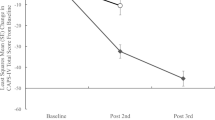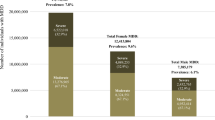Abstract
This pilot randomized controlled trial evaluated a previously developed manualized telephone based cognitive behavioral therapy (T-CBT) intervention compared to face-to-face (f2f) therapy among low-income, urban dwelling HIV infected depressed individuals. The primary outcome was the reduction of depressive symptoms as measured by the Hamliton rating scale for depression scale. The secondary outcome was adherence to HAART as measured by random telephone based pill counts. Outcome measures were collected by trained research assistants masked to treatment allocation. Analysis was based on intention-to-treat. Thirty-four participants met eligibility criteria and were randomly assigned to receive T-CBT (n = 16) or f2f (n = 18). There was no statistically significant difference in depression treatment outcomes comparing f2f to T-CBT. Within group evaluation demonstrated that both the T-CBT and the f2f psychotherapy groups resulted in significant reductions in depressive symptoms. Those who received the T-CBT were significantly more likely to maintain their adherence to antiretroviral medication compared to the f2f treatment. None of the participants discontinued treatment due to adverse events. T-CBT can be delivered to low-income, urban dwelling HIV infected depressed individuals resulting in significant reductions in depression symptoms and improved adherence to antiretroviral medication. Trial Registry: Clinical Trial.gov identifier: NCT01055158.

Similar content being viewed by others
References
Bing EG, Burnam MA, Longshore D, Fleishman JA, Sherbourne CD, London AS, et al. Psychiatric disorders and drug use among human immunodeficiency virus-infected adults in the United States. Arch Gen Psychiatry. 2001;58(8):721–8.
Fairfield KM, Libman H, Davis RB, Eisenberg DM. Delays in protease inhibitor use in clinical practice. J Gen Intern Med. 1999;14(7):395–401.
Gordillo V, del Amo J, Soriano V, Gonzalez-Lahoz J. Sociodemographic and psychological variables influencing adherence to antiretroviral therapy. AIDS. 1999;13(13):1763–9.
Leserman J, Jackson ED, Petitto JM, Golden RN, Silva SG, Perkins DO, et al. Progression to AIDS: the effects of stress, depressive symptoms, and social support. Psychosom Med. 1999;61(3):397–406.
McDaniel JS, Fowlie E, Summerville MB, Farber EW, Cohen-Cole SA. An assessment of rates of psychiatric morbidity and functioning in HIV disease. Gen Hosp Psychiatry. 1995;17(5):346–52.
Cook JA, Cohen MH, Burke J, Grey D, Anastos K, Kirstein L, et al. Effects of depressive symptoms and mental health quality of life on use of highly active antiretroviral therapy among HIV-seropositive women. J Acquir Immune Defic Syndr. 2002;30(4):401–9.
Ickovics JR, Hamburger ME, Vlahov D, Schoenbaum EE, Schuman P, Boland RJ, et al. Mortality, CD4 cell count decline, and depressive symptoms among HIV-seropositive women: longitudinal analysis from the HIV epidemiology research study. JAMA. 2001;285(11):1466–74.
Himelhoch S, Medoff DR. Efficacy of antidepressant medication among HIV-positive individuals with depression: a systematic review and meta-analysis. AIDS Patient Care STDS. 2005;19(12):813–22.
Himelhoch S, Medoff DR, Oyeniyi G. Efficacy of group psychotherapy to reduce depressive symptoms among HIV-infected individuals: a systematic review and meta-analysis. AIDS Patient Care STDS. 2007;21(10):732–9.
Himelhoch S, Josephs JS, Chander G, Korthuis PT, Gebo KA. Use of outpatient mental health services and psychotropic medications among HIV-infected patients in a multisite, multistate study. Gen Hosp Psychiatry. 2009;31(6):538–45.
Williams DR, Gonzalez HM, Neighbors H, Nesse R, Abelson JM, Sweetman J, et al. Prevalence and distribution of major depressive disorder in African Americans, Caribbean blacks, and non-Hispanic whites: results from the national Survey of American Life. Arch Gen Psychiatry. 2007;64(3):305–15.
Voss Horrell SC. Effectiveness of cognitive-behavioral therapy with adult ethnic minority clients: A review. Prof Psychol ResPract. 2008;39(2):160–8.
Ciesla JA, Roberts JE. Meta-analysis of the relationship between HIV infection and risk for depressive disorders. Am J Psychiatry. 2001;158(5):725–30.
DiMatteo MR, Lepper HS, Croghan TW. Depression is a risk factor for noncompliance with medical treatment: meta-analysis of the effects of anxiety and depression on patient adherence. Arch Intern Med. 2000;160(14):2101–7.
Mohr DC, Likosky W, Bertagnolli A, Goodkin DE, Van Der WJ, Dwyer P, et al. Telephone-administered cognitive-behavioral therapy for the treatment of depressive symptoms in multiple sclerosis. J Consult Clin Psychol. 2000;68(2):356–61.
Mohr DC, Hart SL, Julian L, Catledge C, Honos-Webb L, Vella L, et al. Telephone-administered psychotherapy for depression. Arch Gen Psychiatry. 2005;62(9):1007–14.
Simon GE, Ludman EJ, Tutty S, Operskalski B, Von Korff M. Telephone psychotherapy and telephone care management for primary care patients starting antidepressant treatment: a randomized controlled trial. JAMA. 2004;292(8):935–42.
Mohr DC, Hart SL, Howard I, Julian L, Vella L, Catledge C, et al. Barriers to psychotherapy among depressed and nondepressed primary care patients. Ann Behav Med. 2006;32(3):254–8.
Heckman TG, Somlai AM, Peters J, Walker J, Otto-Salaj L, Galdabini CA, et al. Barriers to care among persons living with HIV/AIDS in urban and rural areas. AIDS Care. 1998;10(3):365–75.
Himelhoch S, Mohr D, Maxfield J, Clayton S, Weber E, Medoff D, et al. Feasibility of telephone-based cognitive behavioral therapy targeting major depression among urban dwelling African–American people with co-occurring HIV. Psychol Health Med. 2011;16(2):156–65.
Mohr DC, Spring B, Freedland KE, Beckner V, Arean P, Hollon SD, et al. The selection and design of control conditions for randomized controlled trials of psychological interventions. Psychother Psychosom. 2009;78(5):275–84.
Spitzer R, Kroenke K, Williams JB. Validation and utility of a self-report version of PRIME-MD: the PHQ Primary Care Study. J Am Med Assoc. 1999;282:1737–44.
Wilkinson GS, Robertson GJ, editors. WRAT4:Wide range achievement test professional manual (4th). Lutz: American Psychological Association; 2006.
Sheehan DV, Lecrubier Y, Sheehan KH, Amorim P, Janavs J, Weiller E, et al. The Mini-International Neuropsychiatric Interview (MINI): the development and validation of a structured diagnostic psychiatric interview for DSM-IV and ICD-10. J Clin Psychiatry. 1998;59(Suppl 20):22–33.
Power C, Selnes OA, Grim JA, McArthur JC. HIV Dementia Scale: a rapid screening test. J Acquir Immune Defic Syndr Hum Retrovirol. 1995;8(3):273–8.
Barber JP, Liese BS, Abrams MJ. Development of the cognitive therapy adherence and competence scale. Psychother Res. 2003;13(2):205–21.
Hamilton M. A rating scale for depression. J Neurol Neurosurg Psychiatry. 1960;23:56–62.
Williams JB, Kobak KA, Bech P, Engelhardt N, Evans K, Lipsitz J, et al. The GRID-HAMD: standardization of the Hamilton Depression Rating Scale. Int Clin Psychopharmacol. 2008;23(3):120–9.
Rush AJ, Trivedi MH, Ibrahim HM, Carmody TJ, Arnow B, Klein DN, et al. The 16-Item Quick Inventory of Depressive Symptomatology (QIDS), clinician rating (QIDS-C), and self-report (QIDS-SR): a psychometric evaluation in patients with chronic major depression. Biol Psychiatry. 2003;54(5):573–83.
Horvath AO, Greenberg LS. Development of the working alliance inventory. J Couns Psychol. 1989;36:223–33.
Nabati L, Shea N, McBride L, Gavin C, Bauer MS. Adaptation of a simple patient satisfaction instrument to mental health: psychometric properties. Psychiatry Res. 1998;77(1):51–6.
Kalichman S, Amaral C, Stearns H, White D, Flanagan J, Pope H, et al. Adherence to antiretroviral therapy assessed by unannounced pill counts conducted by telephone. J Gen Intern Med. 2007;22(7):1003–6.
Mohr DC, Ho J, Duffecy J, Reifler D, Sokol L, Burns MN, et al. Effect of telephone-administered versus face-to-face cognitive behavioral therapy on adherence to therapy and depression outcomes among primary care patients: a randomized trial. JAMA. 2012;307(21):2278–85.
Ransom D, Heckman TG, Anderson T, Garske J, Holroyd K, Basta T. Telephone-delivered, interpersonal psychotherapy for HIV-infected rural persons with depression: a pilot trial. Psychiatr Serv. 2008;59(8):871–7.
Stein MD, Herman DS, Bishop D, Anderson BJ, Trisvan E, Lopez R, et al. A telephone-based intervention for depression in HIV patients: negative results from a randomized clinical trial. AIDS Behav. 2007;11(1):15–23.
Safren SA, O’Cleirigh C, Tan JY, Raminani SR, Reilly LC, Otto MW, et al. A randomized controlled trial of cognitive behavioral therapy for adherence and depression (CBT-AD) in HIV-infected individuals. Health Psychol. 2009;28(1):1–10.
Miranda J, Chung JY, Green BL, Krupnick J, Siddique J, Revicki DA, et al. Treating depression in predominantly low-income young minority women: a randomized controlled trial. JAMA. 2003;290(1):57–65.
Dwight-Johnson M, Aisenberg E, Golinelli D, Hong S, O’Brien M, Ludman E. Telephone-based cognitive-behavioral therapy for Latino patients living in rural areas: A randomized pilot study. Psychiatr Serv. 2011;62:936–42.
Lenhart A. Cell Phones and American Adults. Pew Research Center, editor. http://pewinternet.org/Reports/2010/Cell-Phones-and-American-Adults.aspx. 9-2-2010.
Smith A. Mobile Access 2010. Pew Internet and American Life Project. http://pewinternet.org/Reports/2010/Mobile-Access-2010.aspx. 7-7-2010.
Acknowledgments
This project was supported by the National Institute of Mental Health (R34- MH80630)
Disclaimer
The views expressed in this paper are those of the authors. No official endorsement by the National Institutes of Health is intended or should be inferred.
Author information
Authors and Affiliations
Corresponding author
Rights and permissions
About this article
Cite this article
Himelhoch, S., Medoff, D., Maxfield, J. et al. Telephone Based Cognitive Behavioral Therapy Targeting Major Depression Among Urban Dwelling, Low Income People Living with HIV/AIDS: Results of a Randomized Controlled Trial. AIDS Behav 17, 2756–2764 (2013). https://doi.org/10.1007/s10461-013-0465-5
Published:
Issue Date:
DOI: https://doi.org/10.1007/s10461-013-0465-5




